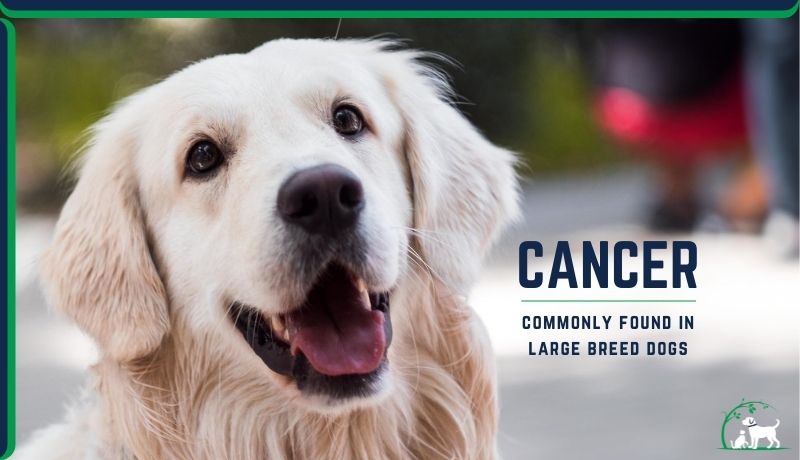5 Cancers Commonly Found in Larger Breed Dogs

In an earlier post, we talked about mast cell tumors. What are they, what causes them and how you can diagnose and treat them.
But there are plenty of other cancers that affect dogs of all ages, breeds … and sizes. In fact, some cancers are more common in larger dogs than in smaller dogs.
Did you know that a study found that 68.3% of golden retrievers were diagnosed with some form of cancer? And 65% of golden retrievers were determined to have died or have been euthanized because of cancer.
So let’s talk about five cancers commonly found in large dogs.
Hemangiosarcoma
Hemangiosarcoma, a cancer that develops from blood vessels, with tumors typically developing in the spleen, liver, skin or heart, can affect any breed. However, hemangiosarcoma is most often found in male:
- German shepherds
- golden retrievers
- Labrador retrievers
Stomach Cancer
While not the most common of canine cancers, stomach cancer can be difficult to treat because symptoms often don’t appear until the cancer has reached an advanced stage.
Dogs with stomach cancer often develop malignant tumors, which can spread to other parts of the body.
The following breeds seem to have a predisposition to stomach cancer:
- rough collie
- Staffordshire bull terrier
- Belgian shepherd dog
- chow chow
Soft Tissue Sarcoma
This type of cancer often presents as a collection of malignant tumors affecting connective tissues, such as fat, muscles and cartilage. They can show up anywhere on the body, but are typically found on the limbs, chest or abdominal wall.
Soft tissue sarcoma can affect dogs of any age and breed. However, it is most often diagnosed in older, large-breed dogs. Golden retrievers, saint bernards and doberman pinschers are known to be at higher risk for developing this type of cancer.
Testicular Cancer
Testicular cancer is exclusive to male dogs (obviously). While this cancer can affect dogs of any age, testicular tumors are usually found in intact (unneutered) dogs over the age of 10 or in dogs with cryptorchidism (undescended testicles).
Breeds with a predisposition to testicular cancer include:
- Afghan hound
- Boxer
- Collies
- German shepherd
- Maltese
- shetland sheepdog
- Weimaraner
Thyroid Cancer
This type of cancer affects the thyroid, a gland in the neck that releases hormones to regulate metabolism and control major bodily functions.
Thyroid tumors are often malignant and tend to spread to the lungs and lymph nodes, as well as the windpipe, blood vessels and esophagus.
While thyroid cancer is not among the more common canine cancers, it can affect older breeds, such as:
- beagles
- boxers
- golden retrievers
Large breed dogs with a predisposition to cancer
According to mortality results of a health survey of purebred dogs in the UK, the following five large breeds showed the highest predisposition to cancer:

NOTE: The cancers listed above are by no means exclusive to the breeds mentioned. Different cancers can affect different types of dogs, no matter their size, breed, gender or age.
Contact your veterinarian immediately if you find any lumps or bumps on your pup, or if you detect any early warning signs of cancer, such as:
- Abnormal or quick-growing lumps or bumps
- Sores or wounds that do not heal
- Swollen or enlarged lymph nodes
- Loss of appetite
- Unexplained weight loss
- Difficulty eating or swallowing
- Difficulty breathing
- Lameness, lack of energy
- Bleeding or oozing from body openings
- Difficulty urinating or defecating
Not all cancers are fatal; many can be treated. Early intervention is critical to a positive outcome following a cancer diagnosis.